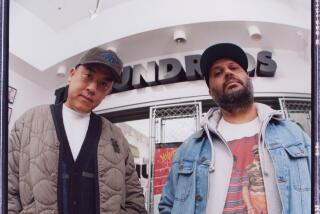Miles’ Raisin Gig Raises New Opportunities : For Buddy Miles, the Raisin Gig Raises Plenty of Opportunities
- Share via
Buddy Miles turned into a raisin two years ago and--after a fashion--regained his place in the sun.
Miles, best known as the drummer in Jimi Hendrix’s Band of Gypsies, hit his peak of popularity in the early ‘70s. After that, a long slide into drug abuse dimmed his star, and even landed him in prison for two stretches between 1976 and 1985. But lately Miles has had a resurgence, not so much as a flesh-and-blood performer, but as Buddy Raisin, lead voice of the California Raisins, the quartet of dancing, animated clay figures that has become an advertising and recording phenomenon.
At 40, Miles is a massive, rotund man with a distinctive, sculpted Afro and a good deal of gilded and jeweled sparkle on his fingers and around his neck and wrists. He is unflaggingly upbeat about his present prospects, and uninhibited in beating his own drum about past associations.
“Just about everybody in the business knows big Buddy,” Miles proclaimed as he sat in the Huntington Beach office of his business agent. Miles may be an inveterate name dropper, but it’s a fact that he has laid down a heavy beat at one time or another for just about every major rock name he drops.
Miles says he got the raisin gig while working on an album with Carlos Santana. The TV commercial’s popularity spawned a million-selling offshoot album of rock and soul oldies remakes, “The California Raisins Sing the Hit Songs.” A sequel, again featuring Miles singing oldies, will be released next week, and a California Raisins Christmas album is in the works.
The question now is whether the man behind the raisin can emerge in his own right and regain some of the stature he had in the late ‘60s and early ‘70s.
After playing in the blues-rock band, Electric Flag, and fronting his own Buddy Miles Express, Miles joined Hendrix and bassist Billy Cox late in 1969 to form the Band of Gypsies. Miles gave the all-black power trio an earthy, funky drum sound that peaked with the memorable, rat-tat-tat explosions on “Machine Gun,” one of Hendrix’s signature songs. Miles later scored a hit of his own, “Them Changes,” with the reformed Express, and collaborated with Carlos Santana on a platinum-selling live album. After his stretches in prison, he reemerged as singer for Santana.
Now Miles has formed a new, seven-piece version of the Express, which will play a series of shakedown shows in Southern California starting tonight at the Coach House in San Juan Capistrano (other dates are Sunday at the Belly Up in Solana Beach, next Friday at the Palomino, and Aug. 20 at the Ventura Theatre). Miles isn’t worried about being overshadowed by his new image as a dancing raisin. In fact, he said he is working “Grapevine” and a few other nuggets from the California Raisins repertoire into his act.
“Why not? It comes off of a platinum album, and right now people are really into listening to that kind of music. Plus, they’re great songs.” Miles, who recently relocated from Marin County to Van Nuys, said he has more than an album’s worth of new material ready for release. Among the tracks is an unusually slow and pleading version of “All Along the Watchtower,” the Bob Dylan song that Hendrix turned into a hard-rock classic.
Miles’ tenure in the Band of Gypsies was short and troubled. He said Hendrix’s management--not Hendrix himself--fired him within a month of the 1969-70 New Year’s concert that was captured live for the group’s only album. He thinks Hendrix’s managers were leery of continuing with an all-black lineup.
“It had to be a racial thing. I think it kind of scared them because of the political aspect at the time.” He said Hendrix flew to Los Angeles shortly after he was dumped and tried to explain or apologize. “I was almost in tears. But I understood where Jimi was coming from. I said, ‘Jimi, I understand what you’ve got to do, what your business is, what your obligations are.’ He said, ‘I don’t care about obligations. I want my music to grow.’ ”
Miles said that was the last time he saw Hendrix before his drug-related death in 1970.
“I was involved in drugs then, but I wasn’t doing what he was doing,” Miles said. “He was self-destructive to the core. It was incredible. I saved his life once, in 1969. He almost jumped out of a 20-story building in New York, ‘cause he was high. He was outside the window, and I pulled him in. I just think the man was hungry for love.”
Miles says the problems that stalled his own career and landed him in prison were “self imposed.” Summing up his outlook now, he quoted from a Crosby, Stills & Nash song: “I don’t want to be crazy and old before my time. I want to ferment, like fine wine.”
More to Read
The biggest entertainment stories
Get our big stories about Hollywood, film, television, music, arts, culture and more right in your inbox as soon as they publish.
You may occasionally receive promotional content from the Los Angeles Times.











